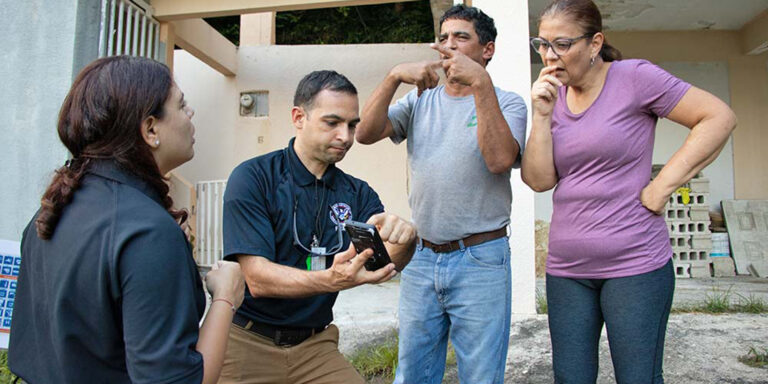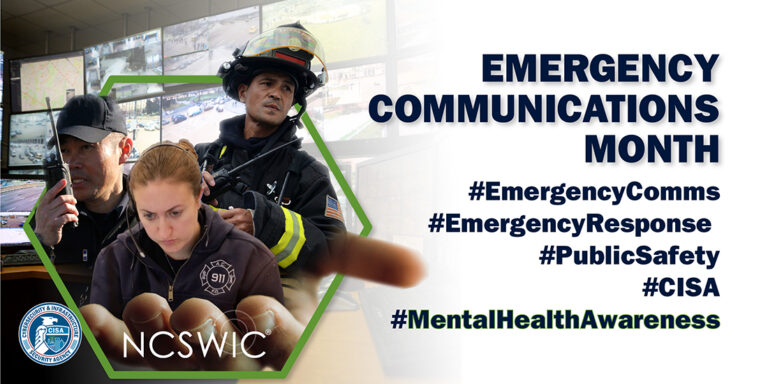
Article Archive by Year

Without adequate support and resources, disasters can leave lasting psychological effects on children. In the United States, an estimated 14% of children experience a natural disaster during childhood. Providing psychosocial support is essential in helping them cope with these challenges, thereby building resilient communities.

How I Became an Accidental Disaster Mental Health Specialist
May 21, 2025
Dr. Adrienne Heinz and her young family have lived through multiple historic wildfires in Northern California. She decided to turn pain into purpose and mobilize community health leaders to build a mental health safety net for healing and recovery. The lessons from those experiences now serve as a guide and

Podcast – Seasonal Forecasts & Their Limitations With Dr. Philip Klotzbach
May 21, 2025
This is an interview with Philip Klotzbach, a podcast by Domestic Preparedness, May 22, 2025. Philip Klotzbach, Ph.D., is a research scientist in the Department of Atmospheric Science at Colorado State University. Dr. Klotzbach developed the two-week forecasts currently being issued during peak months of the hurricane season between August

Physical and Mental Injuries in First Responders: Why Wait?
May 14, 2025
First responders undergo intense physical training to ensure they are physically prepared for emergencies. Yet despite the high-stress nature of their work, mental fitness is not given the same priority. To truly support first responders, mental wellness must be fully integrated into recruit training programs and proactively addressed throughout their

Not Lost in Translation: A Multilingual Corps Approach
May 14, 2025
Disaster survivors and responders often face psychological hazards like acute stress disorder, depression, and post-traumatic stress. These issues are worsened in multilingual communities, where language barriers hinder communication and delay aid. Effectively addressing these challenges goes beyond basic translation or ad hoc interpreting to address the whole community.

Disaster Stress Management in an Emergency Operations Center
May 7, 2025
Disasters affect responders and community members, but they also bring trauma to those working inside emergency operations centers. Distance from the scene does not create a shield from stress. Secondary traumatic stress can impair leadership, so managing this stress is vital for effective emergency response.

A Holistic Strategy for Responders’ Well-Being
May 7, 2025
First responders and emergency managers face constant, high-pressure stress from trauma, long hours, and critical decisions. This often leads to chronic stress, increasing risks of heart disease, mental health issues, and substance abuse. Their ability to help others depends on prioritizing their own well-being through proactive self-care.

Bridging Communication Gaps: Lessons from Hurricane Helene
April 30, 2025
Hurricanes in 2024 caused widespread damage to infrastructure, leading to a critical but often overlooked issue: isolation. Physical and technological disruptions left public safety personnel and government officials unable to perform essential tasks. While physical destruction was visible, the invisible breakdown of communication systems intensified the sense of isolation and

Connectivity: The Foundation of Disaster Response and Preparedness
April 30, 2025
In an era of increasingly frequent and severe weather events, the demands on first responders have never been greater. To navigate high-stakes, rapidly evolving situations, reliable connectivity and cutting-edge technology are essential. A fast, secure, and resilient communications network is the backbone of any effective disaster response.

Editor’s Note – Emergency Communications: Tough Lessons From the Maui Wildfires
April 30, 2025
The after-action report of the Maui wildfires and the authors in the April edition of the Domestic Preparedness Journal share valuable lessons for strengthening emergency communications in an ever-expanding complex communications ecosystem.
Meeting the Psychosocial Needs of Child Survivors
May 21, 2025
Without adequate support and resources, disasters can leave lasting psychological effects on children. In the United States, an estimated 14% of children experience a natural disaster during childhood. Providing psychosocial support is essential in helping them cope with these challenges, thereby building resilient communities.
How I Became an Accidental Disaster Mental Health Specialist
May 21, 2025
Dr. Adrienne Heinz and her young family have lived through multiple historic wildfires in Northern California. She decided to turn pain into purpose and mobilize community health leaders to build a mental health safety net for healing and recovery. The lessons from those experiences now serve as a guide and
Podcast – Seasonal Forecasts & Their Limitations With Dr. Philip Klotzbach
May 21, 2025
This is an interview with Philip Klotzbach, a podcast by Domestic Preparedness, May 22, 2025. Philip Klotzbach, Ph.D., is a research scientist in the Department of Atmospheric Science at Colorado State University. Dr. Klotzbach developed the two-week forecasts currently being issued during peak months of the hurricane season between August
Physical and Mental Injuries in First Responders: Why Wait?
May 14, 2025
First responders undergo intense physical training to ensure they are physically prepared for emergencies. Yet despite the high-stress nature of their work, mental fitness is not given the same priority. To truly support first responders, mental wellness must be fully integrated into recruit training programs and proactively addressed throughout their
Not Lost in Translation: A Multilingual Corps Approach
May 14, 2025
Disaster survivors and responders often face psychological hazards like acute stress disorder, depression, and post-traumatic stress. These issues are worsened in multilingual communities, where language barriers hinder communication and delay aid. Effectively addressing these challenges goes beyond basic translation or ad hoc interpreting to address the whole community.
Disaster Stress Management in an Emergency Operations Center
May 7, 2025
Disasters affect responders and community members, but they also bring trauma to those working inside emergency operations centers. Distance from the scene does not create a shield from stress. Secondary traumatic stress can impair leadership, so managing this stress is vital for effective emergency response.
A Holistic Strategy for Responders’ Well-Being
May 7, 2025
First responders and emergency managers face constant, high-pressure stress from trauma, long hours, and critical decisions. This often leads to chronic stress, increasing risks of heart disease, mental health issues, and substance abuse. Their ability to help others depends on prioritizing their own well-being through proactive self-care.
Bridging Communication Gaps: Lessons from Hurricane Helene
April 30, 2025
Hurricanes in 2024 caused widespread damage to infrastructure, leading to a critical but often overlooked issue: isolation. Physical and technological disruptions left public safety personnel and government officials unable to perform essential tasks. While physical destruction was visible, the invisible breakdown of communication systems intensified the sense of isolation and
Connectivity: The Foundation of Disaster Response and Preparedness
April 30, 2025
In an era of increasingly frequent and severe weather events, the demands on first responders have never been greater. To navigate high-stakes, rapidly evolving situations, reliable connectivity and cutting-edge technology are essential. A fast, secure, and resilient communications network is the backbone of any effective disaster response.
Editor’s Note – Emergency Communications: Tough Lessons From the Maui Wildfires
April 30, 2025
The after-action report of the Maui wildfires and the authors in the April edition of the Domestic Preparedness Journal share valuable lessons for strengthening emergency communications in an ever-expanding complex communications ecosystem.
Follow Us
Get Instant Access
Subscribe today to Domestic Preparedness and get real-world insights for safer communities.
ARchives
Article Out Loud – Physical and Mental Injuries in First Responders: Why Wait?
May 14, 2025
First responders undergo intense physical training to ensure they are physically prepared for emergencies. Yet despite the high-stress nature of their work, mental fitness is not given the same priority. Learn how to support first responders by fully integrating mental wellness into recruit training programs and seeing that it is
Article Out Loud – Disaster Stress Management in an Emergency Operations Center
May 7, 2025
Disasters affect responders and community members, but they also bring trauma to those working inside emergency operations centers. Distance from the scene does not create a shield from stress, and secondary traumatic stress can impair leadership. Learn how vital managing stress is for effective emergency response.
Article Out Loud – A Holistic Strategy for Responders’ Well-Being
May 7, 2025
This is an article by Camilo Olivieri, an Article Out Loud from Domestic Preparedness, May 7, 2025. First responders and emergency managers face constant, high-pressure stress from trauma, long hours, and critical decisions. This often leads to chronic stress, increasing risks of heart disease, mental health issues, and substance abuse.
Article Out Loud – Bridging Communication Gaps: Lessons from Hurricane Helene
April 30, 2025
This is an article by Greg Hauser, an Article Out Loud from Domestic Preparedness, April 30, 2025. Hurricanes in 2024 caused widespread damage to infrastructure, leading to a critical but often overlooked issue: isolation. Physical and technological disruptions left public safety personnel and government officials unable to perform essential tasks.
Article Out Loud – Connectivity: The Foundation of Disaster Response and Preparedness
April 30, 2025
This is an article by Rodrigo (Roddy) Moscoso, an Article Out Loud from Domestic Preparedness, April 23, 2025. As satellite-to-cell tech grows more common, cell phone makers must move quickly to adopt it. This link can bridge emergency services and the public, no matter the disaster or condition of ground
Article Out Loud – Emergency Alerts: The Missing Link
April 23, 2025
This is an article by Rodrigo (Roddy) Moscoso, an Article Out Loud from Domestic Preparedness, April 23, 2025. As satellite-to-cell tech grows more common, cell phone makers must move quickly to adopt it. This link can bridge emergency services and the public, no matter the disaster or condition of ground
Article Out Loud – Hidden Barriers to Public Safety Interoperability
April 23, 2025
This is an article by Gabe Elias, an Article Out Loud from Domestic Preparedness, April 23, 2025. Decades of work have improved public safety’s ability to share information. However, the journey toward better interoperable communication requires uncovering additional hidden barriers. Learn how to examine response operating procedures to uncover those
Article Out Loud – A Regional Approach to Public Safety Communications Planning
April 16, 2025
This is an article by Charles (Charley) Bryson, an Article Out Loud from Domestic Preparedness, April 16, 2025. Despite significant investments in public safety, critical training gaps for first responders persist. Regional planning committees, established by the FCC in the 1980s to manage public safety radio frequencies, remain key to
Article Out Loud – A Systems Thinking Approach to Improving Emergency Communications
April 16, 2025
This is an article by William Chapman, an Article Out Loud from Domestic Preparedness, April 16, 2025. “PACE” planning helps organizations fail gracefully, but systems thinking reduces the likelihood of failure altogether. Learn how combining both approaches helps organizations build resilience, regardless of threat or hazard.
Article Out Loud – Know the Audience: Five Keys to Effective Communication
April 9, 2025
This is an article by Marc Hill, an Article Out Loud from Domestic Preparedness, April 9, 2025. Effective communication starts with understanding your audience—who they are, what they know, why they’re listening, and what they need to hear. Learn how this awareness can help you deliver a message your audience
Follow Us
Get Instant Access
Subscribe today to Domestic Preparedness and get real-world insights for safer communities.


